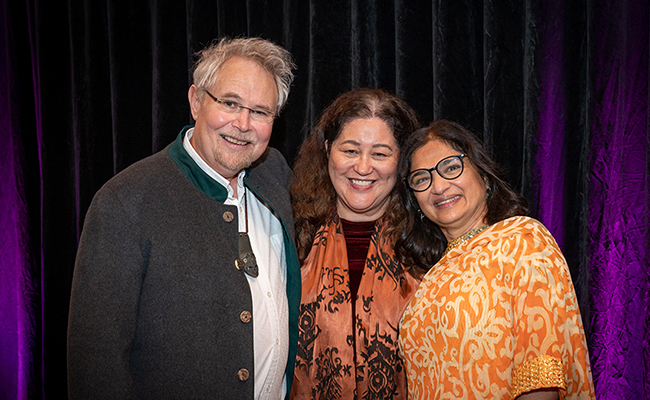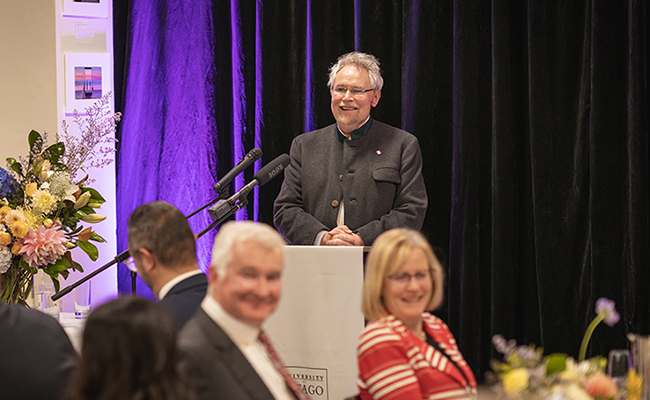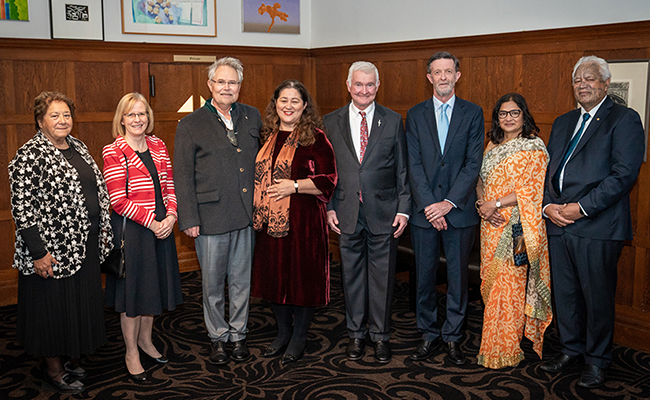
The Rt Hon Dame Cindy Kiro (centre) lauded the extraordinary contribution of the Dunedin Study over the past 50 years. Seen here with Professor Richie Poulton, Director of the Dunedin Study and Professor Poulton's wife Dr Sandhya Ramrakha, a Dunedin Study Senior Research Fellow.
The Governor-General of New Zealand, Her Excellency The Rt Hon Dame Cindy Kiro, GNZM, QSO, visited the longitudinal Dunedin Study last week in recognition of its 50-year achievement and contributions it has made to society.
Dame Cindy, of Ngāpuhi, Ngāti Hine, Ngāti Kahu and British descent, addressed Dunedin Study researchers, dignitaries, alumni, and friends at a function held at the University of Otago's Staff Club, saying the Study has been widely described as the broadest and most in-depth study of human beings ever conducted.
“For 50 years, it has been providing us with profound insights into the question of why we become who we are,” Dame Cindy says.
“The University of Otago, and all New Zealanders can be immensely proud of the Dunedin Study. And while 50 is the number we are celebrating, perhaps just as worthy of celebration is 94 – which represents the percentage of original study members still participating, these 50 years later.
“That figure represents perhaps the most extraordinary achievement of all and is one of the many reasons – along with your rigorous research methods and multidisciplinary approach – that the Dunedin Study remains the worldwide benchmark for a longitudinal study of this kind.”
The visit by Dame Cindy coincides with the completion of a year of celebrations marking the 50th anniversary for the Dunedin Study.
The date of 1 April 1972 represents the first birth date of Dunedin-born babies enrolled in the University of Otago's Dunedin Multidisciplinary Health & Development Study – now known as the Dunedin Study – which over the course of the following year resulted in a total of 1,037 Study members.
Since then, the cohort has been regularly assessed and when Study members contributed to research at the age of 45, 94.1 per cent of living members participated, making it the highest follow-up rate for a study of this design and duration, anywhere in the world.

Professor Richie Poulton addresses dignitaries and colleagues at the event held to recognise the Dunedin Study's 50-year achievement, highlighting local community support as integral to the Study's success.
Director of the Dunedin Study, Professor Richie Poulton, reflects on his involvement in the Study as a “dream come true”.
“I've always been interested in research that has applicability in the real world – for people living real lives. Hopefully through our research efforts we can make their lives better. This also explains the expansion of our research to include several intervention trials, beginning early in life.”
Professor Poulton, who first worked on the Study as an interviewer in 1985, says in addition to generating globally relevant research, it has also become a sense of great pride for the city of Dunedin.
“The local community has supported the Dunedin Study from the very start, and it exemplifies the town and gown relationship that underpins the uniqueness of Dunedin as a tertiary education city,” he says.
As Dame Cindy's visit to Ōtepoti Dunedin was also the first in her role as the Governor-General, an official pōwhiri was held at Ōtākou Marae for Her Excellency and her husband Dr Richard Davies, accompanied by Kaumātua Joe Harawira and Kuia Rānui Ngārimu.
The manuhiri were welcomed on to the Marae by hapū representatives from Te Rūnanga o Ōtākou, Te Rūnanga o Moeraki and Kāti Huirapa Rūnaka ki Puketeraki, with a haka performed by tauira from the Queen's High School and King's High School kapahaka group He Waka Kōtuia.
In her address, Dame Cindy also remarked on the Dunedin Study's alignment with te ao Māori.
“It has also struck me, in reflecting on your achievement, that the Dunedin Study takes an approach aligned with te ao Māori – where context is essential to understanding physical and mental wellbeing, as well as an emphasis on taking a long view,” Dame Cindy says.
Over the past 50 years, Dunedin Study researchers have published more than 1,400 peer-reviewed journal articles, books, and reports on many aspects of human health and development including, but not limited to, behavioural, oral health, and respiratory domains.
Responding to a global gap in midlife aging research, the Dunedin Study has developed a geroscience research programme to understand how to extend our living years of disease-free life. An example of this is the Brain Imaging Project which is using MRI scans to help learn more about how the brain changes with aging.
Run in collaboration with Duke University, North Carolina, the project is using cutting-edge MRI techniques to investigate the correspondence between age-related anatomical changes in the brain and a wide range of other information gathered as part of the Dunedin Study.
Gathering this information while the Study members are still in midlife may help improve the way in which future medical science can predict, treat, and even prevent the onset of brain conditions such as Alzheimer's Disease.
Dame Cindy acknowledged the important contributions of the group, “without whom, the Dunedin Study would not exist – and that is of course the 1,037 participants themselves, as well as your friends and families.
“You have given so much, over such a length of time. On behalf of all those you have helped through your generosity and selflessness – thank you.
“The Dunedin Study is a profoundly human piece of work – one that continues to contribute to a deeper and richer understanding of so many aspects of our lives.”

Attending the 50-year Dunedin Study celebration (left to right), Kuia Rānui Ngārimu, Acting Vice-Chancellor Professor Helen Nicholson, Professor Richie Poulton, The Rt Hon Dame Cindy Kiro and husband Dr Richard Davies, Chancellor Stephen Higgs, Dr Sandhya Ramrakha, and Kaumātua Joe Harawira.
Kōrero by Guy Frederick (Sciences communications advisor)
